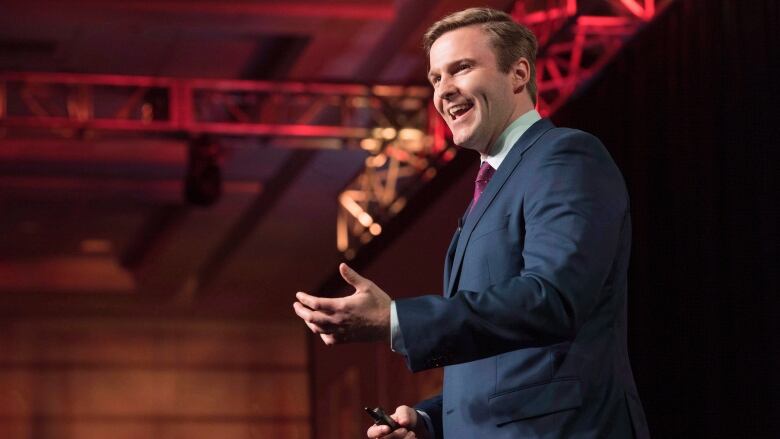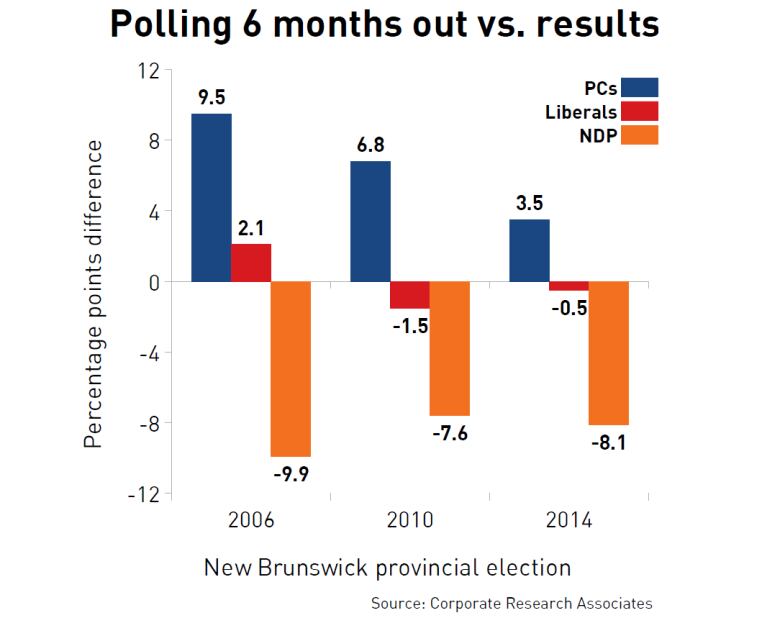Gallant's lead in polls bodes well for his re-election in September
6 months can be an eternity in politics, but recent elections show that leads at this point tend to hold

With six months to go before the New Brunswick election, Brian Gallant's Liberals are in a strong position in the polls.
Andthough six months is an eternity in politics, the last four provincial campaigns suggest that being ahead at this stage bodes well for a party's chances in the vote that matters.
The latest survey from the Corporate Research Associates, conducted between Feb. 1 and March3,put the Liberals ahead of the Progressive Conservatives with 43 to 30 per cent support. The New Democrats trailed in third with 13 per cent, followed by the Greens at 11 per cent.
That 13-point margin between the Liberals and PCs is wider than any margin recorded by CRA in its first-quarter poll in each of the last three election years andits fourth-quarter poll conducted in 2002. (The last three provincial campaigns in New Brunswick have been held in September, while the 2003 election was held in June).
In late 2002, Bernard Lord's PCs were leading Shawn Graham's Liberals by a margin of four points, and subsequently won the 2003 election. In early 2006, Graham was beating Lord by seven points before his Liberals won more seats than the PCs later that year.
In the first quarter of 2010, the pendulum swung back to the PCs David Alward's party was six points up on the Liberals, who would soon be defeated. And then in early 2014, Alward was trailing Gallant's Liberals by 12 points six months before he lost.
Shifts to the PCs since 2006
But while the leading party has won each of the last four elections when it wasahead in the polls six months out, voting intentions have not held steady over that period far from it.
With the exception of 2003, when voting intentions six months before ballots were cast were not markedly different from the actual election result, there have been significant differences between where parties stood at the beginning of an election year and where they stood when the election was over.
On average, the Progressive Conservatives'vote share has been6.6 points higher in the election than where it was in the first-quarter CRA poll in each of the last three election years.
The Liberals, however, have not been impacted by this shift on average, there has been no difference between their polling six months before an election and their actual election result.
Instead, the New Democrats have taken a hit, finishing an average of 8.5 points lower than where they stood earlier in the polls.

There have been some variations from election to election for the PCs. They picked up 9.5 points in 2006 but just 3.5 points in 2014. The NDP has been relatively consistent in its under-performance, dropping 9.9 points in 2006, 7.6 points in 2010 and 8.1 points in 2014.
How these trends would affect the Greens is hard to say, as the party has presented candidates in only the last two elections.
But if these trends are replicated in 2018, it suggests the Liberals could still be in a winning position.
Increasing the PCs' result in the latest CRA poll by about seven points puts them at 37 per cent still six points behind the Liberals. That might be enough to put them in range if the seat distribution breaks disproportionately toward them (if, for example, the Liberals run up the numbers in francophone ridings but lose narrow races to the PCs in anglophone seats), but would still giveGallant a cushion.
Satisfaction ratings
CRA's measure of government satisfaction also suggests the Liberals are in a decent position but not unassailably so.
When Lord was re-elected in 2003, government satisfaction at the end of 2002 stood at 70 per cent. When he was narrowly defeated in 2006 (the PCs won the popular vote but did not win the most seats), satisfaction was at 58 per cent earlier that year.
The latest poll suggests satisfaction with Gallant's government is at 52 per cent, worse than Lord's losing number in 2006. But it puts him well above his two predecessors.
In early 2010, just 34 per cent of New Brunswickerswho were polled weresatisfied with Graham's government before they booted it out. In 2014, satisfaction at the beginning of the year with Alward'sPC administration was only 33 per cent.
So this measure may give mixed signals to Gallant. Satisfaction with his government is not so low that he is on track to be soundly defeated in September. But it is low enough that he could be looking at a close contest which went against Lord in 2006.
Preferred premier numbers
Like the voting intentions numbers, however, Gallant's edge over BlaineHiggsgive him a much more comfortable advantage.
In the latest CRA poll, Gallant stood at 32 per cent on who New Brunswickers prefer for their premier, beating Higgs by 13 points. That compares favourably to when Lord was only ahead of Graham by two points in 2006. In 2010, Graham was losing to Alward by two points. Four years later,Alward was trailing Gallant by nine points.
When Lord was re-elected in 2003, however, he was ahead of Graham by22 points in the polls.

But the 2003 example demonstrates how little can be taken for granted. Lord was the incumbent premier facing a new opposition leader in Graham much like Gallant and Higgs today. Despite leading over Graham personally by 22 points, Lord only won the 2003 election by about one percentage point.
Six months certainly is an eternity in politics, and much can and will change between now and September. But recent history shows that it is far better to be ahead than behind even with a political eternity to go before the next election.












_(720p).jpg)


 OFFICIAL HD MUSIC VIDEO.jpg)
.jpg)



























































































